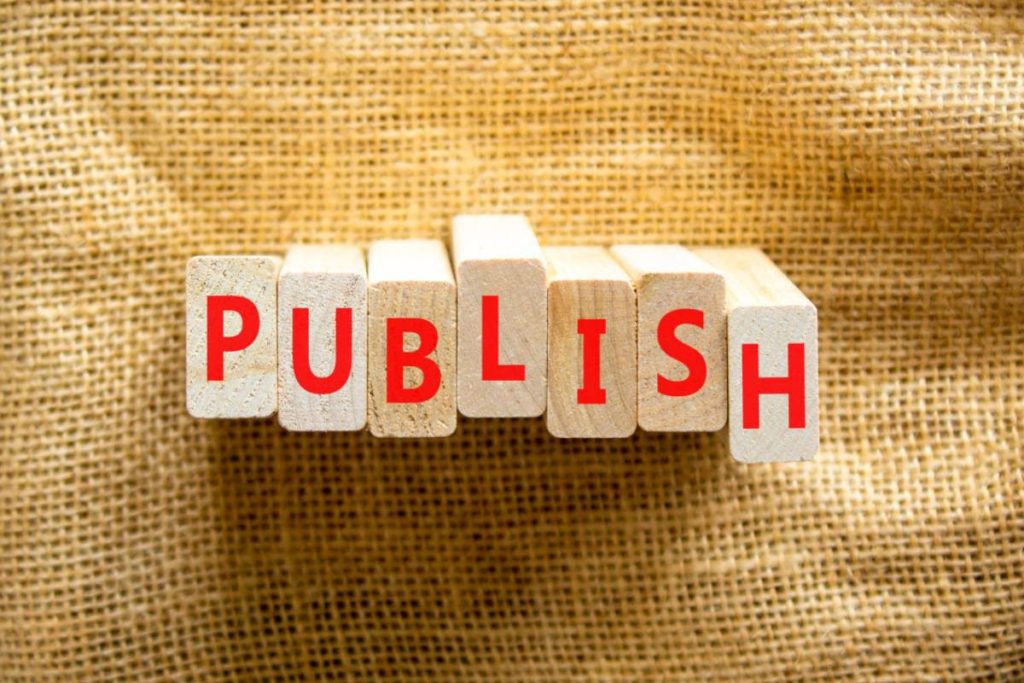According to the Cambridge Dictionary, ‘publishing’ means making written information available to other people. So technically, when you sell someone a book, you have published it. However, there is a real difference between ‘self-publishing‘ and publishing via the ‘traditional route’.
Traditional publishing involves a publisher who publishes your work for you. They edit, print, and sell the work in question. Self publishing is when you edit, print, and sell the work yourself. Understanding this difference is the key to finding the right route to selling your written work.
Publishing a book is a considerable achievement that usually requires a huge amount of work. Some authors may not be totally convinced to publish their book through a traditional stream to get their work out there.
You don’t have to traditionally publish a book in order to sell it. Although it can be a difficult undertaking, self-publishing is possible. It can be a massive success if the book author has a marketable manuscript and a dedication to attracting attention to their work.
Continue reading to find out the main differences between self-publishing and traditional publishing and tips on how to self-publish successfully.

Do You Need a Publishing House To Sell a Book?
There are several benefits to publishing a book under a publisher or agency, such as a network of connections that could help you sell and improve your book.
You don’t need a publishing house to sell a book, as it’s possible to sell a book that you have self-published. As long as you advertise along the proper channels and market yourself and your writing well, you can sell many copies of your self-published book.
There are many reasons why an author might want to self-publish, such as a greater extent of creative freedom and a more significant percentage of the royalties.
Many challenges come with self-publishing, some seemingly insurmountable. However, no challenge is insurmountable, which these authors who self-published made abundantly clear with their smashing success stories.
Self-Publishing vs. Traditional Publishing
There are several pros and cons to both traditional publishing and self-publishing. Publishing a book comes with many huge decisions and responsibilities, so it’s vital that you do your research and make an informed decision on what route is best for your project.
Self-publishing may not be for you if you are utterly clueless about marketing and social media. However, if you are determined, outgoing, resourceful, and great with marketing and social media, self-publishing is a feasible option.
Let’s take a look at the defining traits of publishing houses and self-publishing processes, so we can get more insight into which might be the best course of action for you and your manuscript.
The Function of a Publishing House
Publishing houses have a multitude of functions:
- They single out manuscripts they believe could be successful and profitable.
- They put these manuscripts through a process of refining, editing, and designing to make them more eye-catching to readers.
- They take charge of the marketing and promotion of books that their publishing house is responsible for.
When you publish through an agency or publishing house you as the author get a percentage of the earnings from the sales the book makes.
Publishing houses make their money primarily by “selling” their books to bookstores, so you won’t be making much money if the book isn’t successful through the traditional publishing stream. Unless your book is sold primarily as an e-book.
To learn more about the world’s most prolific publishing houses and the authors and works that have been published through them, read through this Zippia roundup.

Self-Publishing in a Nutshell
Self-publishing is when an author completes the entire process of compiling a book on their own or by seeking out people to help them with this on their own rather than through an agency or publishing house.
This includes:
- Writing
- Editing
- Design
- Proofreading
- Printing
- Marketing
Disadvantages Of Self-Publishing
The disadvantage of self-publishing is that you pay more for the process out of your own pocket. You start without a reputation and must build one up from scratch. You could also find it more challenging to get your book put into more prominent and well-known bookstores.
Advantages Of Self-Publishing
Despite the more significant risks brought about by the intimidating prospect of self-publishing, there are several advantages too. These include:
- You have total creative freedom.
- You get more of the royalties.
- You don’t have to wait for anyone else to get things done.
- You build up an impressive reputation for yourself for doing something notoriously tricky.
Self-publishing allows authors to keep around 70% of the royalties for their books. In contrast, authors only get about 5-18% of the royalties when they go through a publishing house.
Self-published authors might need to spend a significant amount making their book marketable and aesthetically enticing to an audience. However, they still make a more substantial percentage of the total earnings in the end.
The real risk here is determining whether or not your book will be successfully published through non-traditional streams or if it will make more money through traditional channels.
How To Self-Publish Successfully
If you are set on self-publishing, there are ways you can ensure a more significant build-up for your book’s release with various marketing strategies. They include:
- You should probably be active on social media, engage with your audience, and entice potential readers.
- Build a fanbase, get people interested in your book and keep them invested.
Check out this article about the best social media platforms for writers to understand which platforms you should be using if you’re going to self-publish. They also provide examples of authors that have successfully utilized these platforms.
Pursue exposure and reviews by contacting other authors and asking them for insights in exchange for a copy of the book, for instance. Promote your book in any way you can, such as building a website, posting about it online, and spending some money advertising.
Publishing can be an expensive process, but ultimately everything you do to promote your book is going towards its overall success after release. Take a look at veteran publisher Jane Friedman’s account of the history of self-publishing and a guide on how to self-publish today.
Final Thoughts
Though quite a tricky and seemingly treacherous undertaking at times, self-publishing is possible, and many would prefer to put in the extra work to have greater creative freedom. With drive, determination, and insight into marketing and networking, you can successfully self-publish.

